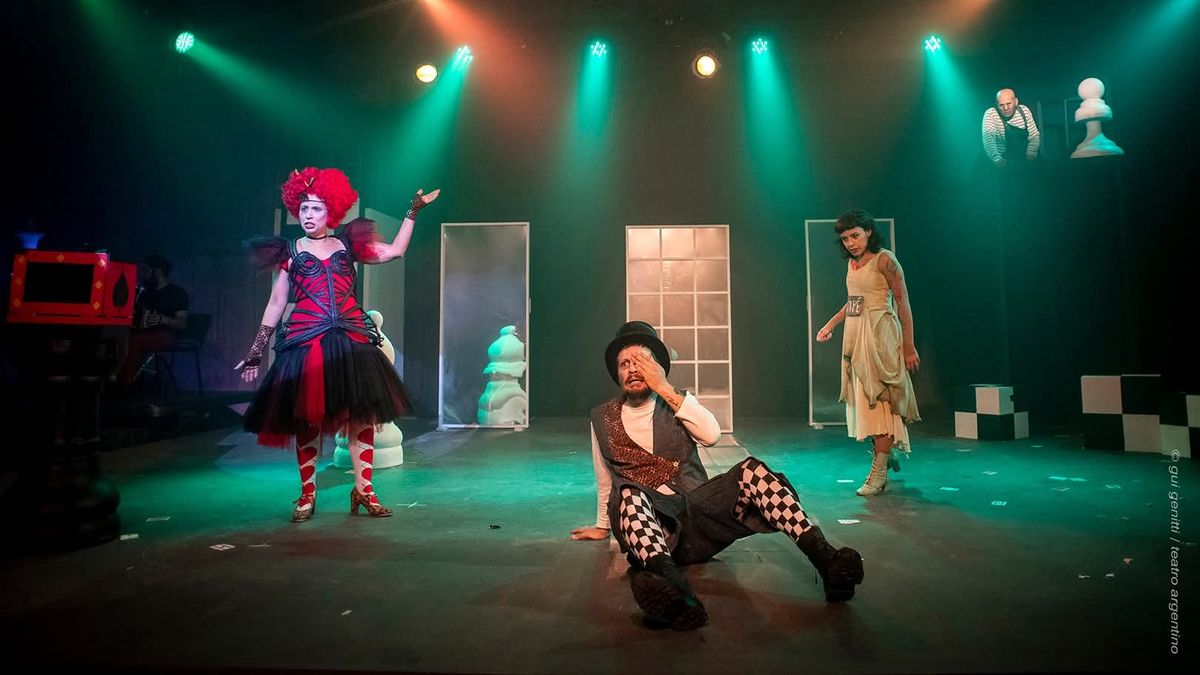“Lewis Carroll wrote his work by discussing certain social impositions. In” Alicia “and then in” Through the mirror “he raises subverting oppressive values for men and women,” says Guillermo Parodi, Author and director of “Country of never (fantastic chess)”, that opens next Saturday at 17 at the Teatro del Pueblo (Lavalle 3636).
The team of “Baja” and “Mandinga (La Capilla del Diablo)” It meets for this new piece. Inda Buh, Great Calibán, Guillermo Flores, Lucía Palacios, Marcelo Rodríguez and Lorena Szekely They are the actors of this journey that takes our recent history and challenges the viewer to dream collectively, even in the midst of disenchantment.
The play displays an intertextual game between magic and theater and gives a central place to live music with the Trio “Kill a tiger”: Juan Pablo Martini (piano), Nicolás Lastra (bandoneon) and Juan Zuberman (percussion).
Scope He talked with Parodi, facing the premiere:
Journalist: How is that collective dream today? Is it typical of other decades from 70?
Guillermo Parodi: The collective dream appeared to me a lot in recent times, it went viral with “the eternauta” but we have been thinking and saying, this need to reconstruct the collective. The country did not explode yet because during the last government there was reconstruction of the social, antibodies were formed against the advance of anarchic neoliberalism that tries to reduce any presence of collective and state activity, stigmatizing and looking for internal enemies. There are two country models, one in which individualism is more marked and another where the encounter allows some growth. We have discussed this since the 70s.
Q.: How do Houdini, María Elena Walsh, Serú Girán or Teresa Parodi contribute to the work? This reversal of Alicia with irrupé how it approaches and how does it move away from that text by Lewis Carroll, here questioning inherited and logical stories imposed?
GP: Lewis Carroll wrote his work also discussing certain social values and impositions. In Alicia and then in “through the mirror” it proposes to subvert certain oppressive values for the common man or woman. In that sense, a certain idea of crossing a mirror and meeting a house legs up where all things are changed place and meaning while outside there is a great field that is like a chess board. Alicia travels as a pawn different lockers and has different meetings. In the prologue of “Through the mirror” there is a very short play and the whole story develops that play. That to me, that I am Correntino, sounded to the estuaries of the Iberá, which is a great mirror of water where there are lots of floating islands, it is a landscape that changes when the wind blows. It is very dangerous if one goes unknown without knowing, it can be lost, then the association was direct. The chess board with boxes that float and make it more nightmare. They resonate “The world upside down” of María Elena, “The country of I do not remember”, because there is some labyrinthine, memory works as the possibility of having experience not to stumble with the same stones. Serú is with “Alicia in the country.” And there are also several things about my mother.
Q.: There is fantasy, riddle, absurd and distortion, are the parameters that sign our present?
GP: We are living a dystopian moment in the world and in this country, officials insult and mistreat the masses, it is a world where everything is disrupted.
Q.: How is that feeling of the ominous described by Freud to break the darkness?
GP: There is some perverse, monstrous and oppressive in this system. I remember when this president assumed that there was a protest that was going to be done and in the discharges there was a recording that prompted people not to demonstrate. That happened in Hitler’s Germany, the same modus operandi. Freedom .. what? Who? The laws, who writes the laws, for whom they write them, these decrees. At the same time with this double speech to save Argentina, the Argentines of good, the perverse is there. Argentina is like a dark room full of furniture and we have to light the light to reach the other side, everything is disrupted, tension, we cross stumbling with these things. The light turns on with the collective.
How do you see theater and culture today?
GP: In frank crisis due to the dismantling of institutions that are national pride and accompanied the production of culture, art, independently, the INT, and so many that accompanied and allowed the development of the activity. In these last 30 years since Ley of Theater was promulgated, the theater grew and gave work to many people, developed trades and professions throughout the country. The exchange between public and shows was built through the INT. In the provinces they are accustomed to seeing theater, when there are people people buy the entrance and go, it is a theater production. I know well because I directed the INT four years. The monies were discussed at a table with the representatives of each region, 26 festivals functioning simultaneously and moving artists, producers, technicians and public. The theater is collective of his, art is collective, so they want to dismantle it, because they do not want us to meet to discuss and be critical beings. The culture will resist and is the great channel against these attacks. The work tries to ask the questions to all this.
Source: Ambito
I am an author and journalist who has worked in the entertainment industry for over a decade. I currently work as a news editor at a major news website, and my focus is on covering the latest trends in entertainment. I also write occasional pieces for other outlets, and have authored two books about the entertainment industry.




